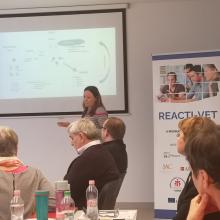Fondazione Istituto Tecnico Superiore per le nuove tecnologie per il made in Italy

Fondazione ITS per le Nuove Tecnologie per il Made in Italy - Jobs Academy (JAC) is a short-cycle higher Education Institution founded in 2010 and located in San Paolo d’Argon (Bergamo) in Lombardy Region, set up to train skilled technicians in strategic areas for Region’s economic development and competitiveness.
The objectives of JAC are:
- increase the employability of young people and give them better job opportunities,
- reduce youth unemployment,
- expand the work-based learning part of study programmes, and, thereby,
- improve the competitiveness of companies and the regional economic development in all productive sectors related to innovation in Italy, with a particular focus on ICT skills and e-jobs.
The Higher Technical Institutes such as JAC are Italy’s initial experiment of vocational tertiary education provision in line with a system established and consolidated for some years, also in other European countries. The higher technical institutes are top-class centres highly specialised in technology, in connection with the production industry.
The educational provision of JAC answers industry’s need for new high-level technical and technological skills to promote innovation processes. It is placed at Level 5 of the EQF (European Qualifications Framework) and give a technical level qualification, after a course lasting four semesters, linked to the 6 technological areas envisaged by Art. 7 of the Prime Minister’s Decree of 25 January 2008 (sustainable mobility, new technologies for life, new technologies for “Made in Italy” products, innovative technologies for cultural heritage and tourism, information and communication technologies, energy efficiency). The courses award credits recognized by universities in compliance with the legislation in force.
JAC has introduced a unique Higher Education Institution (HEI) model in Italy, which applies a strong innovation-oriented on–the-job training approach (dual system), in a real work environment and/or in high-tech laboratories (an approach that is similar to the Fachhochschulen in Germany and SUP in Switzerland). I.e., JAC is pursuing the strategic linking of higher education (HE), research and business: all JAC courses are continuously designed and redefined together with industry representatives taking into account the fast-changing labour market needs, so as to reduce skill shortage and meet the employment demands of the region, with a particular attention given to ICT skills and e-jobs.
Among JAC main peculiarities:
- At least 30% of the duration of the courses is held in the company immediately establishing a very strong link with the production world through internships abroad.
- At least 50% of the teaching staff comes from the world of work. The courses are usually divided into four semesters (1800/2000 hours) and can take up to six semesters. The courses conclude with final checks, conducted by examining committees consisting of representatives of the school, university, vocational training and experts from the world of work.
- Work experience in the company can be carried out under an apprenticeship, ensuring greater integration between training and work, to reduce the misalignment between supply and demand of figures and professional skills mismatch skills.

 Multiplier event - Hungary -
Multiplier event - Hungary -









 Back to the top
Back to the top